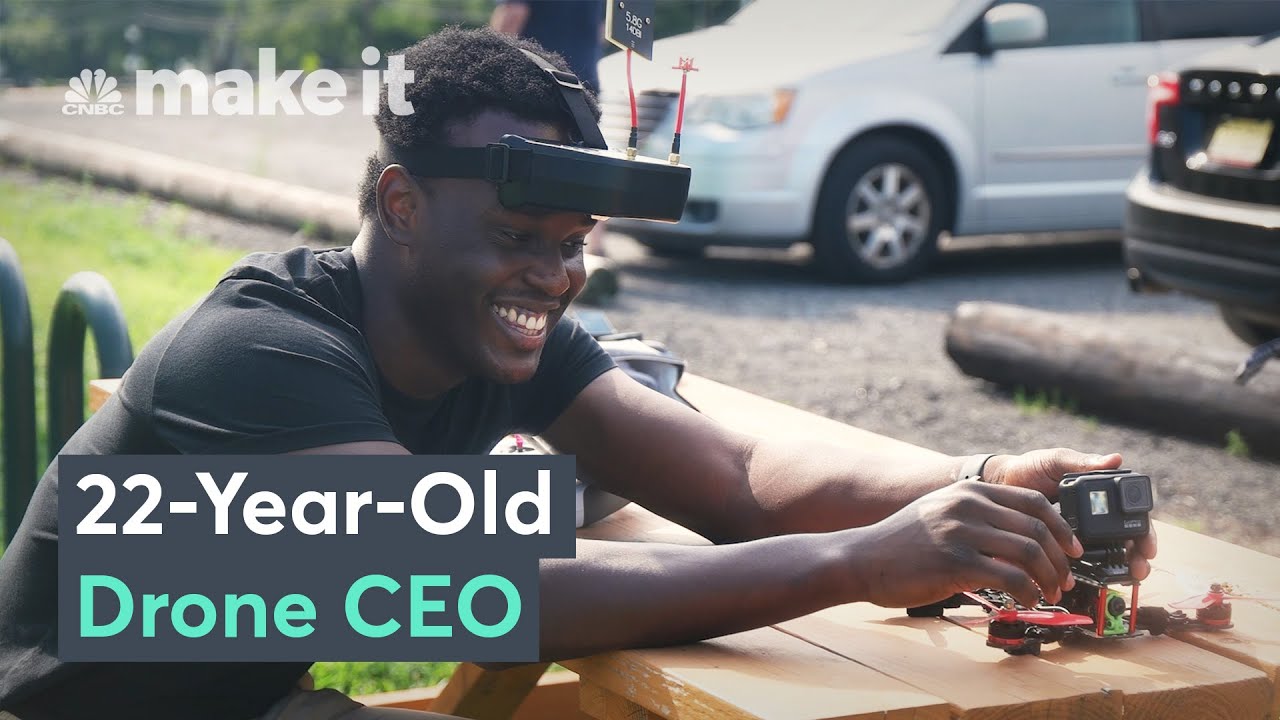Imagine embarking on a thrilling journey to start your very own drone company. At just 22 years old, Dwight Neptune took the leap, transforming his passion for tech and drones into the thriving business known as Beagle Drones. With a backdrop of trials, such as the memorable instance when their first drone literally caught fire, his story is one of perseverance and innovation. This budding company, based in New Jersey, reflects Dwight’s commitment after he chose to leave college and pursue this venture full-time.
In this narrative, you’ll explore the intricacies of creating a tech startup and the challenges faced along the way. Dwight’s journey offers insights into the realities of raising funds, especially as a Black entrepreneur in the competitive tech world. As Beagle Drones aims to raise a significant $1 million for expansion, you’ll get a glimpse into the tenacity needed to succeed and the vision that drives the team towards new heights. This is not just a story about drones; it’s about dreams, dedication, and redefining the potential within a diverse and vibrant industry.

Meet Dwight Neptune, a 22-year-old CEO and co-founder of Beagle Drones. You might start your journey just like Neptune, who began exploring electrical engineering in high school and took up drones as a personal interest. When you and your co-founders craft your initial drone, it might face issues, like their first creation that caught fire because it lacked proper wiring. Located in New Jersey, the company has evolved significantly since then. Neptune left college after three semesters to dedicate himself to Beagle fully. As you pursue growth, Beagle is in the phase of raising $1 million, aiming for a $4 million valuation. Watch the video to discover more about the experience of securing funding as a Black founder.
» Subscribe to CNBC Make It.: http://cnb.cx/2kxl2rf
About CNBC Make It.: CNBC Make It. is a section of CNBC dedicated to making you more knowledgeable about handling business, career, and finances.
Connect with CNBC Make It. Online
Get the latest updates: https://www.cnbc.com/make-it
Find CNBC Make It. on Facebook: https://cnb.cx/LikeCNBCMakeIt
Find CNBC Make It. on Twitter: https://cnb.cx/FollowCNBCMakeIt
Find CNBC Make It. on Instagram: https://bit.ly/InstagramCNBCMakeIt
What It’s Like Starting A Drone Company
The Inspiration and Initial Challenges
Discovering Passion for Technology and Drones
Imagine you’re a young person with a keen interest in technology. For Dwight Neptune, this curiosity began early when he started fiddling with tech gadgets. His passion for technology grew as he delved deeper into the world of electrical engineering during high school. It was here that drones caught his attention, serving as a perfect blend of sophistication and creativity. The allure of First Person View (FPV) technology posed an exciting challenge and opportunity—a way to create something not just technically complex but also immensely enjoyable for users. You find yourself drawn to the possibilities, dreaming about how such innovations could change the way people interact with the world.
Initial Setbacks and Learnings from Failure
Now imagine taking those first bold steps to build something from the ground up. Neptune and his co-founders were deeply passionate and full of enthusiasm. However, early trials came with their setbacks. The initial attempt at building a drone was met with a fiery failure—literally, as it caught on fire due to improper wiring. Rather than discouraging you, such a mishap becomes a learning opportunity, teaching invaluable lessons about the importance of precision and patience in product development. These early challenges lay the foundation, instilling resilience and the courage to persist despite obstacles.
Building the First Prototype
Starting with Off-the-Shelf Parts
You start with the basics, gathering off-the-shelf parts to bring your ideas to life. For Neptune and his team, this meant using available components to construct the initial prototype of their drone. By working in this way, you learn to innovate within constraints, making the best use of what’s in front of you. The experience becomes about experimentation and creativity, transforming simple components into a cohesive product that holds potential beyond its humble beginnings.
Collaborative Efforts with Co-Founders
When venturing into uncharted territory, having a supportive team can make all the difference. For Neptune, this meant collaborating with co-founders who shared his vision and drive. Together, you work long hours, sharing ideas and dividing tasks to pool insights and skills. This collaboration is at the heart of innovation, turning solitary challenges into collective triumphs. You learn the importance of communication, trust, and the synergy that comes from blending diverse skill sets towards a common goal.
From Hobby to Business
Decision to Leave College
Turning a hobby into a business is a bold step, and sometimes it requires difficult choices. For Neptune, this meant making the tough decision to leave college after three semesters. You understand that education is valuable, but sometimes, following your dreams requires taking calculated risks. It’s about weighing the potential of what could be built today against traditional paths, recognizing the unique opportunity to create something impactful.
Transitioning from DIY to Product Development
As the vision of the company begins to crystalize, you transition from do-it-yourself enthusiast to focused product developer. The shift involves moving beyond purely experimental builds to designing products that meet specific consumer needs. For Neptune, this meant refining their drone to be more user-friendly and reliable. This phase teaches you the importance of understanding user experiences, encouraging you to innovate solutions that resonate with the market.
Navigating the Market
Understanding the Competitive Landscape
In the world of startups, understanding the competitive landscape is critical. You dive into researching who your competitors are and what they offer. For Beagle Drones, recognizing the strengths and weaknesses of other players in the market helped shape their strategy. This knowledge is vital; it not only helps in defining what sets your product apart but also keeps you focused on where to improve.
Identifying Unique Selling Propositions
With an understanding of the market, you can identify what makes your product unique. For Beagle Drones, this meant focusing on the FPV technology and enhancing user experience as their unique selling propositions. You learn to articulate these unique points clearly, ensuring potential customers see the value in your offering compared to others. This clarity is key in marketing and in attracting a loyal customer base.
Customer Engagement and Feedback
First Sale and Its Significance
There’s nothing quite like the thrill of your first sale. For Neptune, receiving a notification of the first sale was a moment of disbelief and excitement. It symbolizes validation that your hard work and vision resonate with someone beyond your immediate circle. This milestone is more than just a transaction; it’s a confirmation that your product has a place in the market and provides motivation to keep pushing forward.
Improving Products Based on Feedback
Engaging with customers doesn’t stop at the point of sale. You realize the importance of listening to user feedback to improve your offerings. For Beagle Drones, this meant visiting their first customer to troubleshoot and understand how the product could be better. Each piece of feedback becomes an opportunity for enhancement, helping you refine the product and providing crucial insights that drive innovation and customer satisfaction.
The Daily Grind of a Startup Founder
A Typical Day in the Life of a Drone Company Founder
Running a startup is both exciting and exhausting. For Neptune, a typical day involves long hours beginning at 7 a.m. and often extending past midnight. Your schedule includes everything from product development and strategy meetings to customer interactions and operational tasks. Balancing these responsibilities requires organization and an unwavering focus on the vision.
Balancing Work and Life
While immersing yourself in work is part of a startup’s life, maintaining a balance is equally important. As a founder, it’s easy to be consumed by the demands of the business. Yet, you learn that taking time for yourself and maintaining relationships outside of work is crucial to avoid burnout and keep your passion alive.
Product Development and Innovation
Research and Development Process
Innovation is at the core of any tech startup. Your days are filled with research and development, constantly exploring new ideas and technologies. For Neptune and his team, this involved continuous tinkering and testing, often involving cutting-edge design and rigorous performance evaluations to ensure that every iteration of their product is better than the last.
Designing the Next Generation of Drones
Looking to the future, you focus on developing the next generation of products. For Beagle Drones, innovation meant designing drones with advanced features and aesthetics that feel like alien technology. This forward-thinking approach not only keeps you ahead of competitors but also pushes the boundaries of what’s possible, offering customers an ever-evolving experience.
Diversity Challenges in Entrepreneurship
Facing Biases in the Tech Industry
Navigating the tech industry as an entrepreneur can sometimes present unexpected challenges, especially regarding diversity. For Neptune, being one of the few Black founders in tech boardrooms highlighted the biases that exist. You identify that change is needed, not just for inclusivity’s sake but because diversity brings richness in perspective and innovation.
Building a Diverse Team and Culture
In response, you make a concerted effort to build a diverse team that reflects broad backgrounds and experiences. Doing so creates a culture that is open, accepting, and innovative by nature. For Beagle Drones, the team’s diversity naturally evolved, attracting talent from various corners of the world. This inclusive environment not only fosters creativity but also sets a foundation for lasting success.
Securing Funding and Financial Growth
Experiences with Venture Capitalists
Securing funding is a critical step in the growth journey. As a founder, you often find yourself pitching to venture capitalists, detailing your vision and showcasing potential. For Neptune, these experiences were eye-opening and sometimes challenging, especially when facing misconceptions and biases. However, navigating these situations teaches resilience and the importance of presenting a strong, confident case to potential investors.
Challenges as a Black Founder in Fundraising
For Black founders, the fundraising process can include facing additional barriers. Neptune’s experiences shed light on these challenges, underscoring the need for more representative support structures within the venture capital community. Yet, with determination and a strong vision, you find ways to rise above these hurdles, striving to set a precedent for future entrepreneurs of diverse backgrounds.
Conclusion
Reflecting on the Entrepreneurial Journey
Starting a drone company is a journey filled with aspirations, challenges, and learnings. Reflecting on this path, you recognize the growth that comes not just from success, but from perseverance through failure. Each step taken is not just a lesson learned but a building block towards creating something truly extraordinary.
Advice for Aspiring Drone Entrepreneurs
For those inspired to embark on a similar path, the advice is simple: be prepared to work harder than you ever thought possible, embrace collaboration, and maintain an unwavering belief in your vision. With passion, resilience, and an openness to continual learning, you can turn any hobby into a successful venture that leaves a lasting impact.
